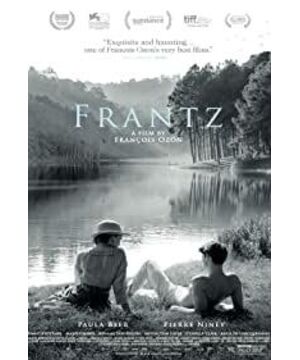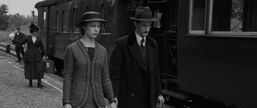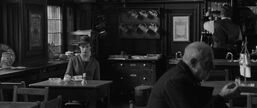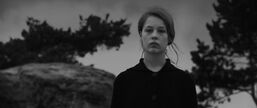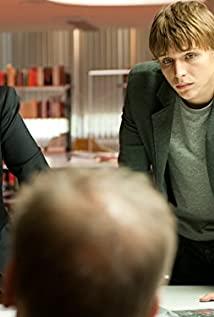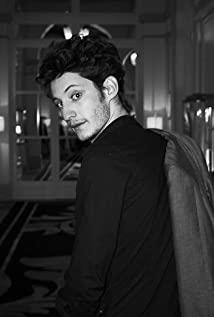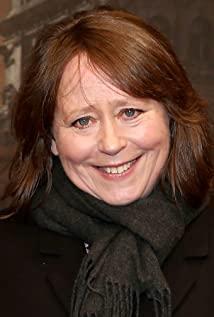Franz is a reflection on war set in Germany and France shortly after World War I. The French youth Adrian suddenly appeared in front of the tombstone of the German youth Franz, and was just seen by Franz's fiancée Anna, so Adrian started a relationship with the Franz family as a friend of Franz, and had a relationship with Anna. Gradually fall in love. But in the end, Anna couldn't stand the torment in her heart and told Anna the truth. It turned out that Adrian was not Franz's friend, but met Franz on the battlefield and shot and killed him. Adrian found his letter to Anna in Franz's hands, and found Franz's gun not even loaded. After the war, Adrian could not stand the condemnation of his conscience, so he came to Germany to seek forgiveness from the Franz family. But when he gradually got to know Franz in Germany, he was unable to tell the truth in the face of grieving Franz's parents and Anna, so he made up the fact that he and Franz were good friends. Adrian tells Anna the truth before leaving Germany. Anna couldn't bear to want to commit suicide for a time, but was rescued by someone else. After Adrian returned to France, he wrote to Anna and asked Anna to forward a letter to Franz's parents stating the truth. Anna decisively burned the letter and made up a belief for Franz's parents. Anna comforted Franz's parents in this way, not wanting to make the pain worse. As time passed, Anna couldn't forget Adrian, and the reply letter she mustered up to give Adrian was returned by the post office, so she went to France alone to find Adrian with the encouragement of Franz's mother. When she arrived in France, she discovered that it wasn't just Germany that was devastated and demeaning in the war, but France too. Anna eventually finds Adrian, and she lies to Adrian that Franz's parents know the truth and forgive him. The affection between the two can be seen in one look, but Adrian rejected him. At that time, Adrian already had a fiancée. Finally, the two kissed goodbye at the train station. Anna wrote to tell Franz's parents that they were living happily with Adrian in Paris. But in fact, she was left alone in Paris.
From the plot to the shooting techniques are very romantic, but it is rare that the rhythm of the film is enough to attract the audience. The film is fast-paced and twists and turns.
The first half of the film describes post-war Germany from the perspective of the young French Adrian; the second half of the film describes post-war France from the perspective of the German girl Anna. The film is a reflection on the war, but it does not involve too many political issues, but focuses on humanistic concerns, so that audiences from different cultural backgrounds can empathize. When I heard the "Marseilles" being sung in a French tavern, I couldn't help but think of our own country, which was once devastated, and it was also tenaciously resisting foreign aggression. Using such a story to tell the war is actually very bloody, but because of the shooting techniques and the acting skills of the actors, the bloody blood is also ignored. Moreover, it is refreshing to talk about the war from the side and express the view of peace. If domestic war movies can be made like this, it would be really amazing.
The film uses alternating color and black and white footage. But it's not the usual black and white of the past, color of the present. Instead, I used color images in the past tense and black and white in the present tense. At the same time, in the present time, the color of the picture also changes with the emotions of the characters. One of the scenes is very typical. When Anna and Adrian were walking on a hill in a German town, the two "remembered" Franz, and the picture gradually changed from black and white to color, because the content of the memories of the two protagonists was also From sadness to happy memory.
In the first half of the film, Adrian's fabricated lies are also shown through colorful pictures, making the audience believe it. And the director also deliberately misled the audience through some specious pictures and Adrian's dodging remarks, making the audience think that Adrian and Franz were once lovers. For example, there is a scene where Adrian gently touches his hand when he is teaching Franz to play the violin; another example is Adrian telling Anna that Franz is the biggest scar in his heart. When the truth is revealed, the audience suddenly finds that Adrian's behavior and behavior up front is completely reasonable. This made me think that a lie can actually be shot as a fact, without the need for a shaky, dreamy lens. The big reversal produced by misleading the audience is actually very interesting.
The video before and after is very good. For example, in the first half of the film, Adrian felt hot and went to swim in the lake. I think this clip has several functions: First, it shows the scars on Adrian's body and expresses his anti-war views. Secondly, the information that Anna can't swim is introduced, paving the way for Anna's attempt to commit suicide by jumping into the lake in the middle of the film. In the end, a romantic and ambiguous atmosphere was created, which also paved the way for the later emotional progress of the two.
The film festival is fast and slow. Fast in the ups and downs of the plot, slow in the depiction of details. The two complement each other perfectly. This is also the reason why the plot is progressing rapidly, but the audience feels that the emotional transition is reasonable. This is the work of the writers, directors, and actors. In this kind of film, acting is very important. With a glance between Adrian and Anna, you can feel the great pain that the two are in love but can't get married, as well as the heavy information of the country, nation, war, etc. hidden behind them. Adrian's acting is just amazing. At the beginning of the film, when Adrian stood with Franz in "Memories", I also subconsciously sighed that "people really can't be compared", because in contrast, Franz is much prettier than Adrian. But with the development of the plot, Adrian's emotional line gradually increased, I can only keep sighing in my heart that Adrian is so handsome. And his eyes are extremely bright and focused. There is also a scene that really impressed me, when Adrian entered Franz's room for the first time under the guidance of Hans, the camera only gave Adrian a medium shot, but I caught him all at once. Eye. It's a black and white picture, and the eyes are black and white. The black pupils are round and embedded in the eyes, the upper and lower eyelids just wrap the pupils, there is no white space up and down, and the left and right white spaces are just right. Impressed because it really surprised me. This shows how important a pair of talking eyes is to an actor. It's a godsend meal.
The character Franz only appears in memories. Although it is an important clue to advance the development of the plot, there are not many appearances here. This kind of treatment is so suitable for this kind of plot, which not only fully narrates the history of the story, but also leaves plenty of room for the emotional development of the main characters. This is also a blank creation method.
In the end, not a single shot was wasted in the film, and not a single line was empty talk. The film is still very Ou Rong style. It is very imaginative with the style of "Into the House". Plenty of white space and romance. In this way, one-step film can accommodate huge information, tell the story of the main clues well, and reveal a little bit of other huge background to the audience, and leave the rest to the audience's imagination.
A movie can't be too spacey, but it can't be too full either. It is best to be between niche literature and mass commerce.
Just like Franz.
View more about Frantz reviews


